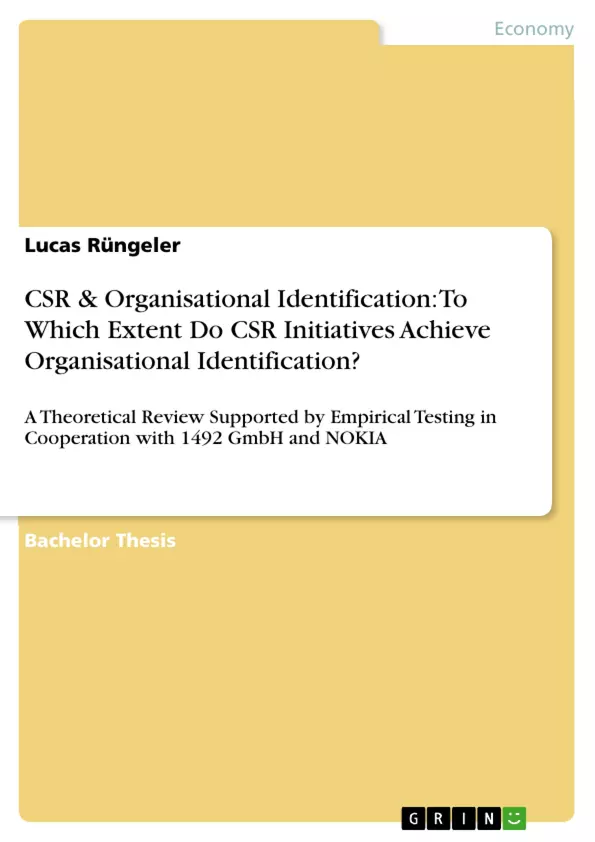Since organisations become larger, complex and boundary-less, organisational identification is viewed as a means for providing cohesion and as key ingredient of organisational success. According to Bhattacharya and colleagues the individuals’ identification with the company results into several positive effects, such as cooperative behaviour, less employee turnover due to higher satisfaction, as well as having strong human capital in terms of knowledge and skills. At the same time a study by Carmeli and colleagues suggests that the corporate social responsibility (CSR) of a company is positively associated with the employees’ identification.
On that score the theoretical analysis of the thesis will reconstruct this correlation by referring to three distinct processes, in particular affinity, emulation, as well as categorisation and self-enhancement, that describe the emergence of organisational identification of employees. Finally, it will be discussed in how far CSR initiatives may serve as a driver to trigger off the three processes.
Inhaltsverzeichnis (Table of Contents)
- Introduction
- Question and Objectives
- Methodology
- Corporate Social Responsibility
- History of Corporate Social Responsibility
- Theoretical and Conceptual Framework of CSR Initiatives
- Corporate Social Responsibility
- Corporate Citizenship
- CSR and CC as Basis for the Understanding of CSR Initiatives
- The Usage of CSR Initiatives To Establish Lasting Stakeholder-Group Relationships With Employees
- Basic Ideas of Stakeholder Theory & Stakeholder Management
- Identification of Employees as First-Class-Stakeholder-Group
- Intermediate Result
- Organisational Identification of Employees
- Theoretical and Conceptual Framework
- The Emergence of the Concept of Organisational Identification
- The Social Identity Approach as Theoretical Ground Work
- The Social Identity Approach Applied to Organisations
- Organisational Identification as Specific Form of Social Identification
- Dimensions and Foci
- Identity and Image of Organisations as Precondition for Organisational Identification
- The Significance for Companies and Individuals
- Reasoning for the Interest in Organisational Identification by Companies
- Reasoning for the Interest in Organisational Identification by Individuals
- Intermediate Result
- Corporate Social Responsibility & Organisational Identification: To Which Extent Do CSR Initiatives Achieve Organisational Identification?
- Functional Chain of Organisational Identification
- Processes of the Emergence for Organisational Identification
- Affinity
- Emulation
- Categorisation and Self-Enhancement
- To Which Extent Do CSR Initiatives Achieve Organisational Identification?: Theoretical Reconstruction, Recent Developments in Scientific Research and Discussion
- Intermediate Result
- Empirical Testing: CSR & Organisational Identification in Terms of a Telecommunications Company
Zielsetzung und Themenschwerpunkte (Objectives and Key Themes)
This thesis investigates the relationship between corporate social responsibility (CSR) initiatives and organisational identification. Its primary objective is to determine the extent to which CSR initiatives influence employees' identification with their organisation.
- The historical development and theoretical framework of CSR and corporate citizenship (CC)
- The role of CSR initiatives in fostering stakeholder relationships, particularly with employees
- The concept of organisational identification and its theoretical underpinnings, particularly within the social identity approach
- The connection between CSR initiatives and organisational identification, including the functional chain of identification emergence and potential processes like affinity, emulation, and categorisation
- Empirical research on the relationship between CSR initiatives and organisational identification, using the example of a telecommunications company
Zusammenfassung der Kapitel (Chapter Summaries)
The introductory chapter presents the research question and objectives of the thesis, highlighting the importance of organisational identification and the growing role of CSR initiatives in fostering positive employee relationships.
Chapter two provides a comprehensive overview of corporate social responsibility (CSR), tracing its historical development and exploring its theoretical and conceptual framework. It examines the distinction between CSR and corporate citizenship (CC), focusing on their shared foundation for understanding CSR initiatives. Furthermore, the chapter examines the use of CSR initiatives to establish lasting relationships with stakeholders, particularly employees, through the lens of stakeholder theory and management.
Chapter three delves into the theoretical and conceptual framework of organisational identification. It explores the emergence of the concept and examines the social identity approach as its theoretical foundation. The chapter then applies this approach to organisations, analyzing organisational identification as a specific form of social identification and exploring its dimensions and foci. Finally, it discusses the significance of organisational identification for both companies and individuals.
Chapter four investigates the connection between CSR initiatives and organisational identification. It proposes a functional chain for the emergence of organisational identification and outlines the processes involved, including affinity, emulation, and categorisation and self-enhancement. This chapter also reviews existing theoretical reconstructions and recent developments in scientific research and discussion regarding the influence of CSR initiatives on organisational identification.
Schlüsselwörter (Keywords)
This thesis focuses on the relationship between corporate social responsibility (CSR), corporate citizenship (CC), organisational identification (OI), stakeholder theory, social identity approach, affinity, emulation, and categorisation. It examines the influence of CSR initiatives on employee identification with their organisation, exploring the processes and mechanisms involved.
Frequently Asked Questions
What is the relationship between CSR and Organizational Identification?
Corporate Social Responsibility (CSR) initiatives can act as a driver for employees to identify more strongly with their organization, leading to higher satisfaction and lower turnover.
What are the three processes of emergence for organizational identification?
The thesis identifies affinity, emulation, and categorization/self-enhancement as the key processes through which employees develop identification with their company.
What is the 'Social Identity Approach'?
It is the theoretical foundation of the thesis, explaining how individuals define themselves through their membership in social groups, such as organizations.
Why is organizational identification important for companies?
It provides cohesion in complex organizations and leads to positive effects like cooperative behavior and a strong human capital of skills and knowledge.
Does the thesis include empirical research?
Yes, the theoretical findings are tested through an empirical study of a telecommunications company.
- Citation du texte
- Lucas Rüngeler (Auteur), 2009, CSR & Organisational Identification: To Which Extent Do CSR Initiatives Achieve Organisational Identification?, Munich, GRIN Verlag, https://www.grin.com/document/154235



